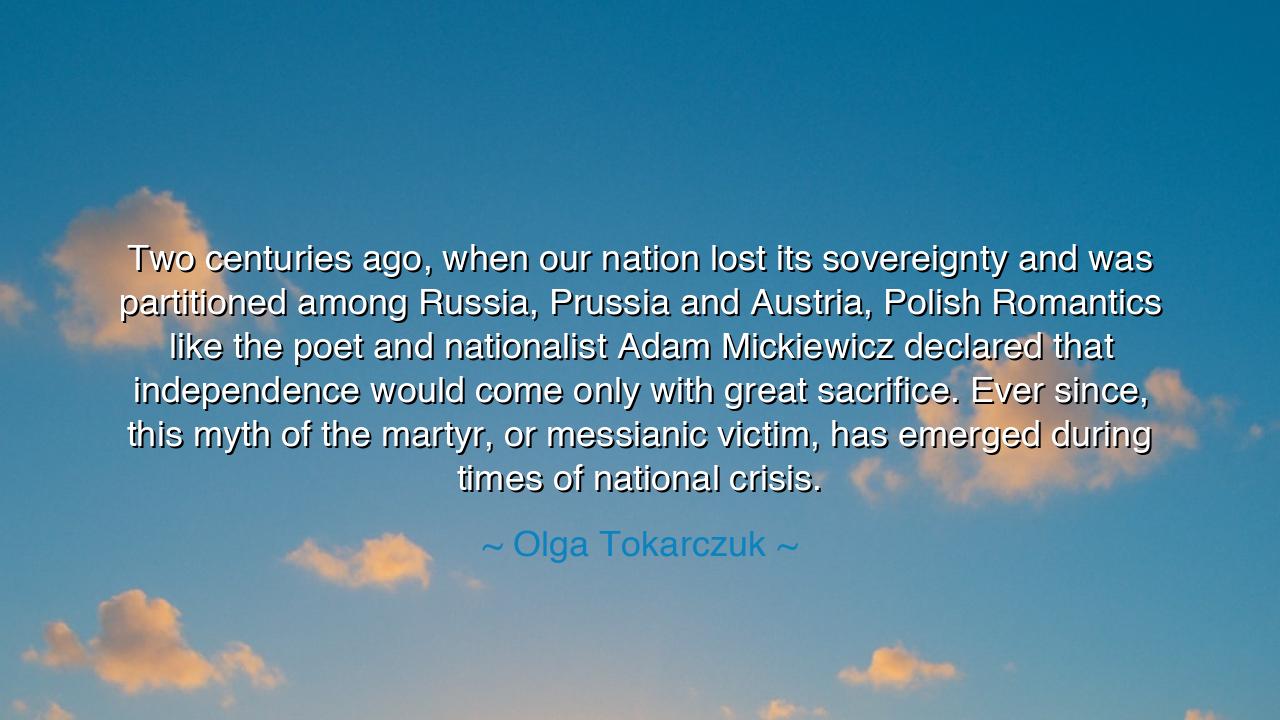
Two centuries ago, when our nation lost its sovereignty and was
Two centuries ago, when our nation lost its sovereignty and was partitioned among Russia, Prussia and Austria, Polish Romantics like the poet and nationalist Adam Mickiewicz declared that independence would come only with great sacrifice. Ever since, this myth of the martyr, or messianic victim, has emerged during times of national crisis.






“Two centuries ago, when our nation lost its sovereignty and was partitioned among Russia, Prussia and Austria, Polish Romantics like the poet and nationalist Adam Mickiewicz declared that independence would come only with great sacrifice. Ever since, this myth of the martyr, or messianic victim, has emerged during times of national crisis.” Thus spoke Olga Tokarczuk, a daughter of Poland and a witness to its enduring soul — a writer who sees not only history’s wounds but the spirit that breathes through them. In her words echo the sorrow and strength of a people who have died many times, yet never ceased to rise again. She reminds us that freedom, once lost, is reborn only through sacrifice, and that nations, like souls, find redemption not through conquest but through suffering and endurance.
To understand her meaning, one must turn back to the 18th century, when Poland, once proud and sovereign, was torn apart by the greed of empires. The three powers — Russia, Prussia, and Austria — divided her lands like spoils, erasing her borders from the map. Yet though her body was scattered, her spirit did not die. From that abyss arose the voice of the Romantic poets, prophets of the Polish heart. Chief among them was Adam Mickiewicz, whose verses became both scripture and sword for the nationless. He spoke of Poland as the Christ of Nations, crucified for the sins of Europe, destined to suffer so that others might awaken to freedom. Through him and his generation, the myth of the martyr-nation was born — a belief that sacrifice itself was sacred, that through pain Poland would one day be resurrected.
Such myths, though forged in anguish, sustain a people when reason falters. They give form to grief and purpose to despair. In the century that followed, Poland’s sons and daughters fought and fell again — in the uprisings of 1830 and 1863, in the wars of 1918 and 1939, in the ashes of Warsaw and the frozen camps of Siberia. And each time, as Tokarczuk recalls, the myth of martyrdom returned, like a candle relit from the embers of the fallen. To die for Poland became a kind of holiness; to suffer for her freedom, a form of prayer. It was this spirit that kept alive a nation without borders, a homeland that lived not on maps, but in the hearts of its people.
Yet Tokarczuk, the wise chronicler of modern Poland, speaks with both reverence and caution. For though myths can sustain, they can also ensnare. The myth of the martyr, she says, has a double edge: it can inspire courage in the face of tyranny, but it can also teach a people to love their suffering too deeply — to mistake pain for purpose and tragedy for destiny. When nations come to define themselves only through their wounds, they risk becoming prisoners of their past. The heroism that once saved them may harden into pride, and pride, unchecked, can blind. Thus, her reflection is both homage and warning — that even the holiest myth must someday give way to renewal, that a nation must learn not only to die nobly, but to live wisely.
Consider the story of World War II, when Poland again became a crucible of sacrifice. From the courage of the Warsaw Uprising to the endurance of those who preserved culture in secret, the Polish people once more fulfilled Mickiewicz’s prophecy. They suffered as martyrs, yet emerged as victors of spirit. But in the aftermath, when the land lay in ruin and the people under Soviet shadow, there came a quieter challenge: how to rebuild, how to turn pain into progress. The myth of martyrdom had carried them through war — but it could not teach them how to live in peace. And so, the new Poland had to find a new faith: not in dying for freedom, but in creating a world worthy of it.
This is the heart of Tokarczuk’s wisdom. She honors the martyr’s fire, yet urges her people to move beyond it. Every generation, she says, must reinterpret its myths, must ask not only, What did our ancestors die for? but What shall we live for? For freedom, once regained, must not become a monument to grief, but a garden of growth. The true heirs of the fallen are not those who weep at their graves, but those who plant seeds upon them — who transform suffering into compassion, nationalism into humanity, and memory into wisdom.
So, my child of both sorrow and hope, take this teaching into your heart: sacrifice may win a nation’s freedom, but wisdom must preserve it. Honor your martyrs, but do not worship their pain. Let their blood be not a chain, but a river that nourishes life. When crisis comes — as it always will — remember the courage of your forebears, but also their yearning for peace. Build upon their sacrifice, but do not repeat it in vain. For as Olga Tokarczuk teaches, the destiny of nations, like that of souls, is not to suffer endlessly, but to transcend suffering — to turn mourning into meaning, and freedom into light.






AAdministratorAdministrator
Welcome, honored guests. Please leave a comment, we will respond soon